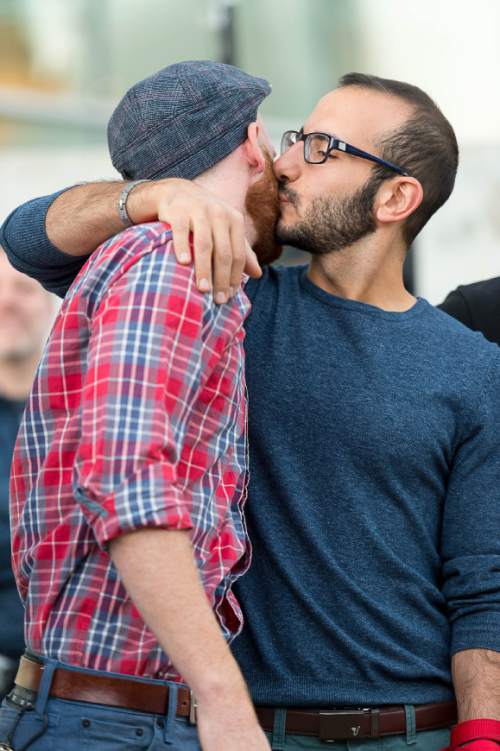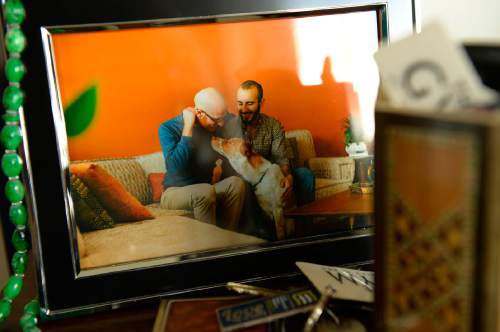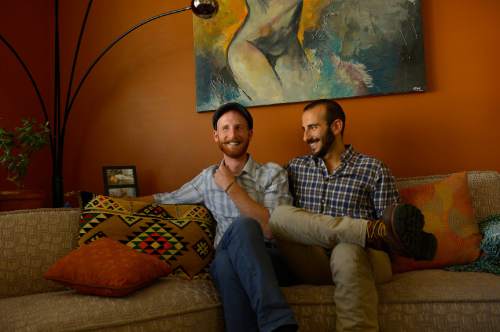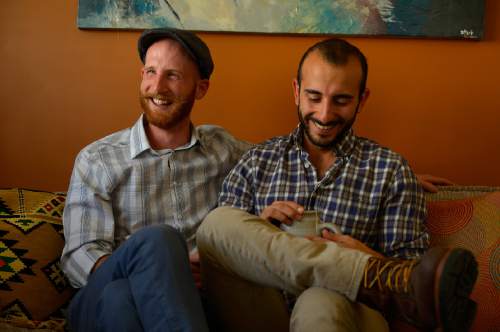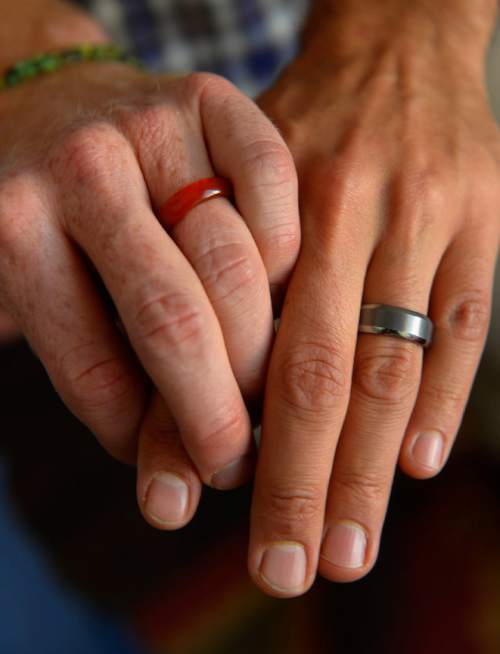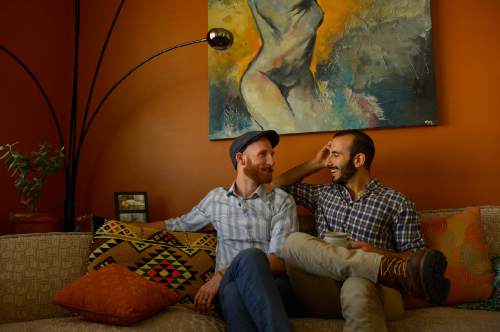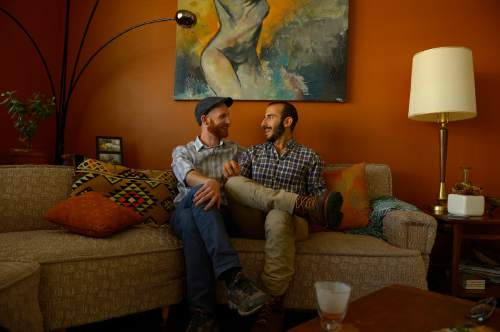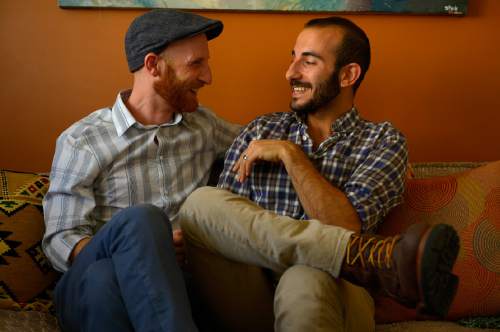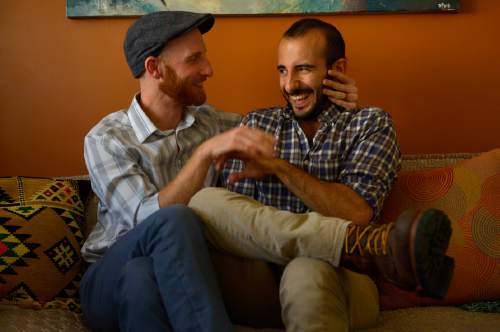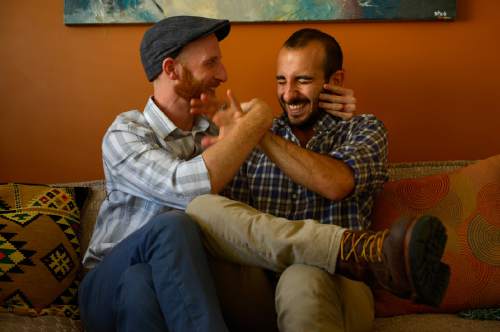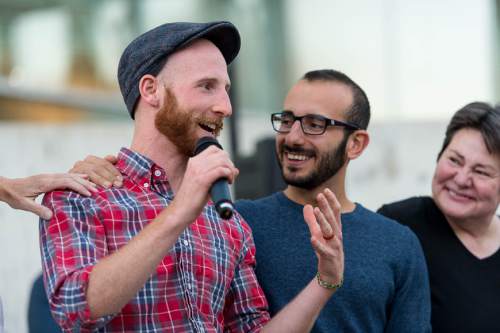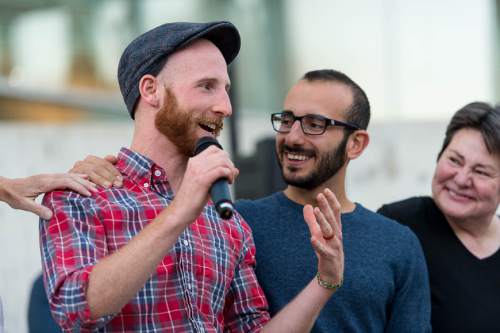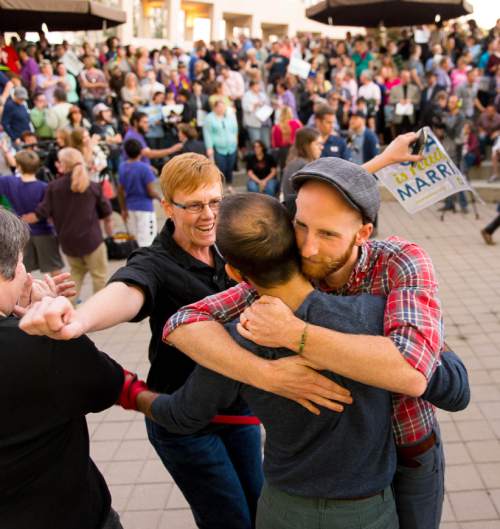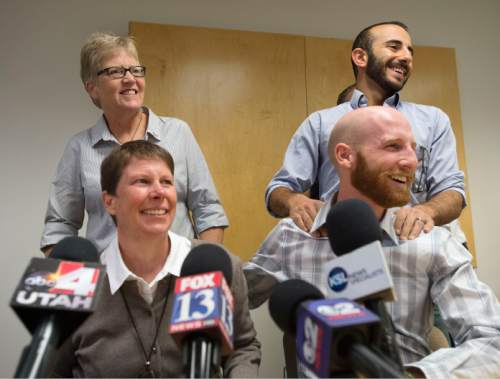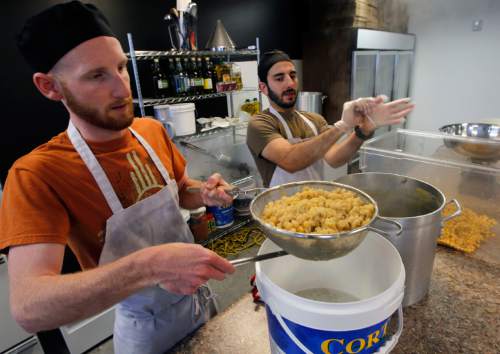This is an archived article that was published on sltrib.com in 2014, and information in the article may be outdated. It is provided only for personal research purposes and may not be reprinted.
Long before strangers began stopping him on the street, open armed and grateful, before he became the face of a history-making movement, Derek Kitchen was being chased down his high school hallway by a mob of students hurling crumpled-up newspapers at his head.
He was 16. The year was 2004. The election was all anybody could talk about.
On the ballot, after president and governor, was a proposal to officially outlaw gay marriage in Utah: Amendment 3.
Kitchen was too young to cast a vote. But when a student journalist asked him how he would — if he could — Kitchen said he wouldn't support any candidate, or measure, that was anti-gay.
By then, Kitchen had only just begun to find words for feelings he'd had all his life. They were the same words he heard tossed around school hallways as insults, accusations, shame.
When the school paper identified Kitchen as a gay student in its election coverage, he still hadn't said the words aloud.
But it didn't matter. He was outed, and there was no going back.
That night, Kitchen went after Amendment 3 with a black marker.
It was his first battle in a war that would change Utah, and the rest of the country, forever.
—
"Famous people" • Years from now, when history recalls the first time a federal judge overturned a state ban on same-sex marriage, it will remember Utah.
It will remember Kitchen v. Herbert.
"My name is on it."
He's not alone. Kitchen is one of six gay and lesbian plaintiffs who sued the state for marriage rights. Their names — Karen Archer, Kate Call, Kody Partridge, Moudi Sbeity, Laurie Wood — will be forever tied to the case that brought same-sex marriage to Utah and set a groundbreaking precedent that began a wave of similar decisions across the U.S.
Bans on same-sex marriage have been overturned in 25 states and counting.
Kitchen's name — and Utah's case — is cited in almost every one.
It's little wonder that in Salt Lake City and beyond, Kitchen and his partner, Sbeity, have become overnight celebrities.
Their names carry the weight of a movement. Their faces have been shown in newspapers, television broadcasts, websites and magazines around the world.
In the park, on the street, at the supermarket, the couple said, they get recognized.
Recently, as they stood in a Harmons debating the merits of canned fruit, a shopper stopped. She nearly dropped her groceries.
"Famous people!" she exclaimed, eyes widening in recognition.
Sbeity, who is never quite prepared for the shock and awe with which he and Kitchen are sometimes greeted, gave her a hug.
They get smiles from strangers, notes from long-lost acquaintances, high-fives from customers buying hummus from their booth at the Downtown Farmers Market.
As he was leaving the gym recently, Kitchen said, a man he's never spoken to stuck out his fist for a congratulatory bump.
—
Partners • The leaves in Logan were changing when Sbeity and Kitchen first met.
Sbeity, who was evacuated to Utah from his home in Lebanon, was studying at Utah State University and keeping a blog about economics and philosophy.
Kitchen, a student at the University of Utah, was a frequent commenter. The two began exchanging emails, getting to know each other through intellectual debates and daily musings. When they met in person five years ago, on Oct. 10, 2009, the men say they just knew.
"It felt so natural right away," Kitchen said. "It was love at first sight."
After that, hardly a day has passed when the two are not in touch. They maintained a relationship between Logan and Salt Lake City with frequent calls, emails, texts. They drove back and forth.
On Christmas of that year, Kitchen went to Lebanon to meet Sbeity's family.
When the couple moved into a shared apartment behind the Utah Capitol, they bonded over a shared love of cooking.
In February 2012, they quit their jobs to start a business: a homemade hummus-making operation called Laziz. They now sell to more than 30 businesses and man a stand at farmers markets year-round.
They're partners, Sbeity said, in every sense of the word — in business, in love, in life.
When they speak, they look to each other for cues, place a warm hand on one another's shoulder, chest, knee. They find each others' eyes when they talk about how in love they are. Anyone left watching feels as if, for a moment, they've forgotten anyone else is in the room.
"He makes me a better person," Sbeity said. "He really is my best friend. I've never gotten sick over the past years of spending 24/7 with him."
In 2013, the couple registered as domestic partners. It was the first time marriage even entered their minds.
They always assumed they would have to leave Utah to wed, though they wanted to have and rear a family here.
That changed in December, when a federal judge ruled that all Utahns — gay, straight or otherwise — have a "fundamental right to marry." For 17 days, same-sex couples rushed county clerk offices across the state. More than 1,200 married.
Suddenly, marriage seemed less of an abstract idea and more real. It wasn't just a dream, Kitchen and Sbeity said. It was possible.
At a Valentine's Day fundraiser, Kitchen got down on one knee and offered Sbeity a ring.
He said yes.
—
What's in a name • The first time Kitchen and Sbeity were approached about joining a lawsuit challenging the state's ban on same-sex unions, they said no.
Gay-rights activist Mark Lawrence approached the two at a meeting of the Utah Gay and Lesbian Chamber of Commerce in 2013. He said they would make strong plaintiffs. He asked them to meet with two attorneys who agreed to take the case.
Sbeity refused. His family remained in Lebanon, where, until this year, people could be imprisoned for having sex with someone of the same gender. He feared what would happen if he and Kitchen joined a high-profile case, what would happen to his family if the news traveled overseas.
But Kitchen was intrigued. He got Sbeity to talk to the lawyers.
James Magleby, one of the lead attorneys in the case, said the moment he saw them, he hoped he could persuade them to join.
They were responsible, fresh-faced, warm. They owned a business. Kitchen was a homegrown Utahn; Sbeity was living out the American dream.
"Not to mention," Magleby said. "I thought they'd make cute plaintiffs."
He went over the risks, which, at the time, he said, felt more than possible — they felt like virtual certainties.
"I've had cases with death threats, we've gotten hate mail and email," Magleby said. "We thought this case was going to be that on steroids."
The couple left the meeting with Magleby and attorney Peggy Tomsic without giving a final answer. They wanted to ponder it, talk about it with their families.
Kitchen's mother, Joni Jensen, begged him not to do it.
"It scared me to death," Jensen said. "I was afraid for his safety. I was afraid people would lash out at him. I was afraid his business would suffer. I was afraid how the family reaction would be. More than anything else, I was very, very terrified for his safety. I pleaded with him to stay out of it."
Ultimately, Kitchen and Sbeity said it was something they had to do. They agreed.
In their second meeting, mere days before the lawsuit was filed with the U.S. District Court in March 2013, Kitchen made a request:
"If I'm going to do this," he said. "I want to do it all the way."
The person whose name came first would receive the most attention, the most scrutiny and, perhaps, be in the most danger, Magleby had warned.
"Amendment 3 is more than just an unjust law," Kitchen said. "It's the reason I came out. It's personal."
—
Victory • Every win seemed like an impossibility until it happened, Kitchen said.
First, at the district court, when federal Judge Robert J. Shelby overturned Amendment 3 on Dec. 20, 2013.
Then, at the 10th U.S. Circuit Court of Appeals, when a panel of two out of three judges found that Americans were entitled to a fundamental right to marry, and no state law could ban same-sex couples from exercising that right.
On Monday, when the U.S. Supreme Court's sudden rejection of the Kitchen case and six others like it effectively legalized marriage in Utah and 10 other states in one fell swoop, Kitchen said he was stunned.
After a whirlwind year in which the case was at the forefront of everything he and Sbeity did, discussed and thought about, it felt like the floor had dropped out from under them.
"This case has been our lives for a year and a half, and we just weren't expecting it to end so abruptly," Kitchen said.
"It's like our other plaintiff, Laurie, always says: It's like you're training and you're in the preseason and you make it all the way to the playoffs, but then the other team forfeits. So you're thrilled that you won, but maybe a little disappointed that you didn't get to play."
Sbeity said he, too, felt joy, but with a touch of mourning.
"It's the end of a journey with people that you care about," Sbeity said. "There was a real sense of purpose."
But now, the couple said, they can move forward. They can plan their wedding — a big affair in a public space where any well-wishers would be welcome. Together, they can start the rest of their lives.
They're working on plans to open a Middle Eastern deli downtown. They want to leverage their newfound fame and name recognition to advocate for new causes: transgender rights, equality in the Middle East, youth outreach.
When they have kids, Sbeity said, he wants them to share a name with the case that changed countless lives.
Kitchen shrugs off the suggestion that he's any sort of hero. He points to his lawyers, his fellow plaintiffs, his partner. For him, it's enough to finish the battle he started 10 years ago, as he crouched, Sharpie in hand, making his first mark on Amendment 3.
On white signs that dotted his South Jordan neighborhood urging Utahns to "vote YES on 3," a young Kitchen crossed out the words and wrote "NO" in big block letters.
He stole signs, threw them in the trash.
But new ones, it seemed, would always appear. In November 2004, the measure passed.
For so long, it felt like a fight Kitchen couldn't win.
Until he did.
mlang@sltrib.com @Marissa_Jae


